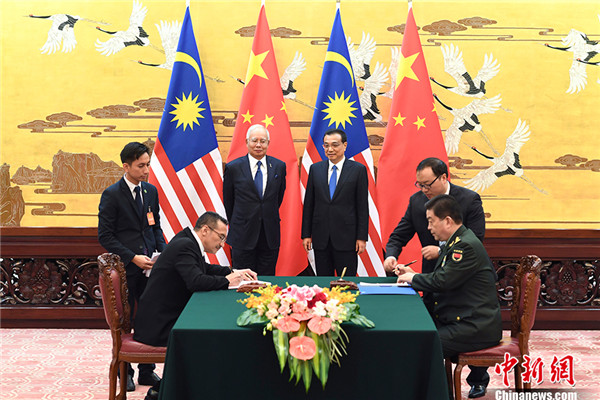Prime Minister Najib's trip comes as Malaysia's ties with China grow stronger. The two countries have worked together building a joint industrial zone in China. Now they are doing the same in Malaysia.

China, Malaysia sign infrastructure, defense deals
For centuries, bird's nest soup has been a delicacy throughout the Chinese world. Foreigners may recoil at the thought of eating bird saliva, but demand is creating a lucrative business in Malaysia, one of the largest habitats of the swiftlet.
"60 to 70% of our export sell to China," said Beh Yan Hui, marketing director of Tian Ma Bird Nest Sdn Bhd.
For now, China only imports the processed product. But this could change soon.
And when it does, Malaysia wants to be ready. In 2013, two countries started to built a China-Malaysia industrial zone in Qinzhou. It will offer one-stop services for the industry, with customs, inspection and processing center. Malaysian companies can take advantage of this potential major gateway to the Chinese market.
Beh Yan Hui said, "We are keeping watching out for the policy changing. Moving our factory to Qinzhou is one option."
But one-way trade isn't enough. A near-identical industrial zone is going up in Malaysia's Kuantan, with the name reversed.
"In early days, industrial zones were aimed at introducing outside capital and companies into China. But now the outside still needs China's technology and capacity. So when we started this zone in China, Malaysian Prime Minister Najib asked, "Why not make a copy on the other side?" said Gao Pu, deputy executive director of China-Malaysia Qinzhou Industrial Park.
According to the plan of both governments, two industrial zones will introduce industries and sectors based on each country's specialty. For example, palm tree oil production, and bird nest processing will be carried out in China whereas steel production, ceramic and pharmaceutical will focus in Malaysia.
Same tax incentives, same logistics support. It's no accident these industrial zone look alike. It's intentional
Gao said, "In fact we are pursuing unified standards in the two industrial zones to avoid all unnecessary procedures. For example, customs and inspection from both sides are verifying each other's procedures so that all imports and exports just need to be checked once."
There's another reason Kuantan was chosen. Malaysia hopes the project can help its less-developed areas.
"We find that this is a very significant project. It's not just for profit, it’s for the development and entire corridor on the east coast, which is generally a poorer cousin of the west side of Malaysia," said Lee Chun Fai, director of Malaysia-China Kuantan Industrial Park.
Building twin industrial parks is a new concept in China's overseas strategy. Similar projects are in talks with Thailand and South Korea. And as any Chinese will tell you, having more bird's nest soup is always a good thing, especially when it's faster and cheaper.















